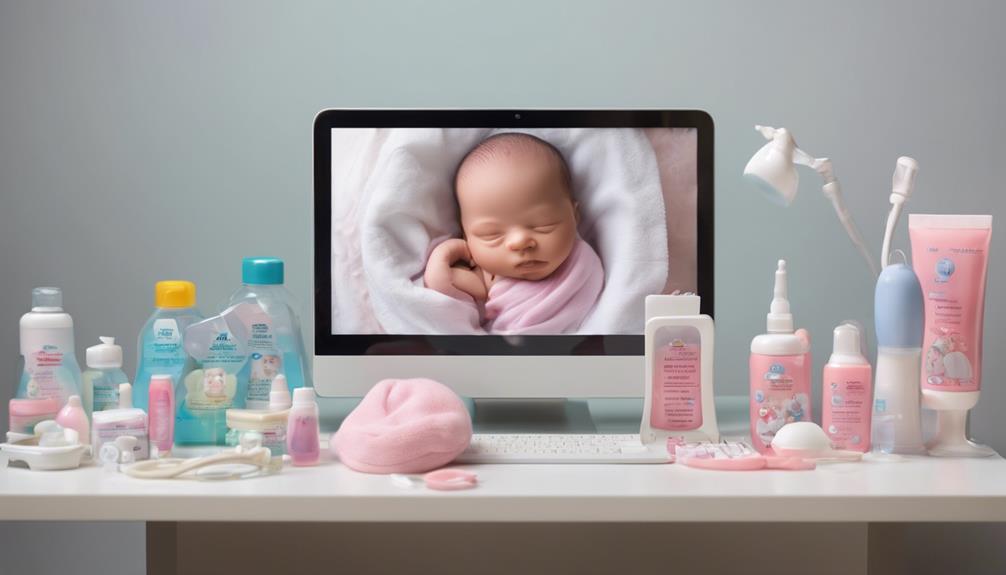When our little one started having frequent watery stools, we were puzzled about how to manage it effectively.
Understanding the causes behind newborn diarrhea is essential, but knowing how to handle it is equally important.
From hydration monitoring to recognizing warning signs, this guide provides practical strategies for caregivers facing this common challenge.
Mastering the art of managing newborn watery poop is not just about cleaning up messes; it's about safeguarding your baby's health and well-being.
Key Takeaways
- Monitor stool consistency and hydration closely.
- Breastfeed or provide formula to maintain nutrients.
- Watch for dehydration signs and contact a pediatrician.
- Practice good hygiene to prevent infections and diaper rash.
Causes of Newborn Watery Poop
Newborn watery poop can be triggered by various factors, such as infections, allergies, antibiotics, and dietary changes. When our little ones experience diarrhea, it can be concerning for us as parents. Infections like rotavirus or norovirus are common culprits that can lead to watery stools in babies. Allergies to breast milk, formula, or certain foods can also result in these watery episodes, causing discomfort for our little bundles of joy.
If either the mother or baby has taken antibiotics, it can disrupt the delicate balance of gut flora, leading to watery poop in newborns. Additionally, any sudden changes in the baby's diet, such as introducing new foods, can also trigger episodes of diarrhea. Ensuring awareness of dehydration in newborns due to watery poop is crucial, as they're more vulnerable to complications from fluid loss.
Diagnosing Newborn Watery Poop
When faced with newborn watery poop, our focus shifts to identifying the underlying causes through careful observation of stool frequency, consistency, and color.
Watery poop in a newborn can be a sign of diarrhea, especially if it's consistently loose and runny. This could indicate infections, food sensitivities, or formula intolerance. It's important to consult a healthcare provider to determine the root cause of the watery poop in newborns accurately.
By monitoring hydration levels and seeking prompt medical advice, we can effectively manage newborn watery poop. If you notice persistent watery stools in your newborn, it's essential to seek professional guidance to rule out any serious underlying issues.
Managing Newborn Watery Poop at Home
To effectively manage newborn watery poop at home, focus on closely monitoring your little one's stool consistency and frequency. For breastfed babies, continue breastfeeding to provide essential nutrients and antibodies that can help combat infections causing diarrhea. Formula-fed babies should be offered their formula regularly to make sure they are getting the necessary fluid and electrolytes. It's important to watch out for signs of dehydration, such as decreased urination, dry mouth, or sunken fontanelle, and contact your pediatrician if you notice any concerning symptoms. Remember to maintain good hygiene practices by promptly changing diapers to prevent diaper rash and infections related to watery stools. Below is a helpful table summarizing key points to manage newborn watery poop at home effectively:
| Breastfed Babies | Formula-fed Babies | General Tips |
|---|---|---|
| Keep breastfeeding | Offer formula regularly | Monitor hydration |
| Watch for signs of dehydration | Make sure proper formula mixing | Maintain good hygiene |
When to Seek Medical Help

As parents, it's important to be vigilant for specific signs indicating that medical attention may be necessary when your baby experiences watery poop. If your newborn has watery poop with signs of dehydration such as decreased urine output or dry mouth, it's vital to seek medical help promptly.
Contact a healthcare provider if the diarrhea is accompanied by fever, vomiting, or irritability, as these could indicate a more serious issue. Immediate medical attention is needed if your baby's watery poop contains blood or mucus, as this may point to an underlying condition that requires treatment.
Watch out for warning signs of dehydration in newborns with watery poop, like no wet diapers for several hours. If you notice any concerning symptoms or if you're unsure about your baby's condition, don't hesitate to call your pediatrician for guidance and evaluation. It's always better to err on the side of caution when it comes to your baby's health.
Tips for Preventing Newborn Watery Poop
Proper latch and breastfeeding technique play an essential role in preventing excess air intake, a common cause of watery poop in newborns. When it comes to keeping your baby's stools healthy and regular, here are some tips to contemplate:
- Monitor Feeding Schedule: Pay attention to your baby's feeding cues and avoid overfeeding, as this can lead to digestive issues and watery stools.
- Delay Solid Foods: Wait until your newborn's digestive system is more developed before introducing solid foods to prevent potential digestive upsets.
- Practice Good Hygiene: Maintain proper hygiene practices, such as washing hands before handling your baby or preparing bottles, to reduce the risk of infections that can cause watery poop.
- Consult Lactation Experts: Consider seeking guidance from a lactation consultant or healthcare provider if watery poop persists, as they can offer valuable advice on underlying issues or necessary adjustments.
Frequently Asked Questions
What Should I Do if My Newborn Has Watery Poop?
If our newborn has watery poop, we should closely monitor hydration levels and contact the pediatrician if concerns arise. Consider underlying causes like diet changes or infections. Keeping track of feeding patterns can provide valuable insight.
How Do You Settle Watery Poop?
When settling watery poop, we focus on hydration, feeding frequently, and monitoring for any concerning symptoms. We consult healthcare providers if needed and stay vigilant with diaper changes and baby's well-being.
Does Breast Milk Make Baby Poop Watery?
Yes, breast milk can make baby poop watery, as it has a high water content that aids in hydration and digestion. The composition of breast milk varies, affecting stool consistency. Colostrum to mature milk change impacts poop texture.
How Can I Stop My Breastfed Baby From Having Diarrhea Fast?
We can help by adjusting our diet, ensuring a proper latch, and monitoring feeding patterns. Seek guidance from a lactation consultant or healthcare provider if needed. Remember, breast milk provides valuable antibodies. Let's work together to keep our baby healthy.
Conclusion
In the journey of caring for our little ones, managing newborn watery poop can feel like charting uncharted waters. Remember, just as a steady hand guides a ship through rough seas, with proper knowledge and vigilance, we can help our babies sail through this challenge.
By staying attuned to their needs and seeking help when needed, we can guarantee smooth sailing for our precious bundles of joy.









